Colorful and bright, the Macaw is one of the most beautiful exotic birds on this planet. Known for their incredible ability to mimic human speech, these birds truly embody the incredible rainforest habitats from which they originate.
In some cultures, the Macaw is thought of as the sacred mother of the human species. In others, the Macaw is a boastful creature who tries to outshine the sun. Read on to learn all about the many traditions surrounding this exceptional bird.
Macaw Symbolism and Meaning
Macaws are the largest members of the parrot family and are famous for a number of unique and impressive traits. For one thing, Macaws evolved in colorful rainforest environments and, as such, are plumed in bright and vibrant colors. These birds are also very well known for their vocal abilities. Alongside the range of calls and songs that Macaws perform, these birds are adept at mimicry and can be taught to repeat a wide range of human speech and other sounds. For these reasons, Macaws represent creativity, intelligence, communication, expression, and vivaciousness.
Incredibly, the Macaw can live for up to one hundred years under ideal conditions. It is not uncommon for people who keep Macaws as pets to have to make arrangements for their birds due to the likelihood that their Macaw will outlive them. So, Macaws may represent longevity, medicine, wisdom, healing, and foresight. (1)
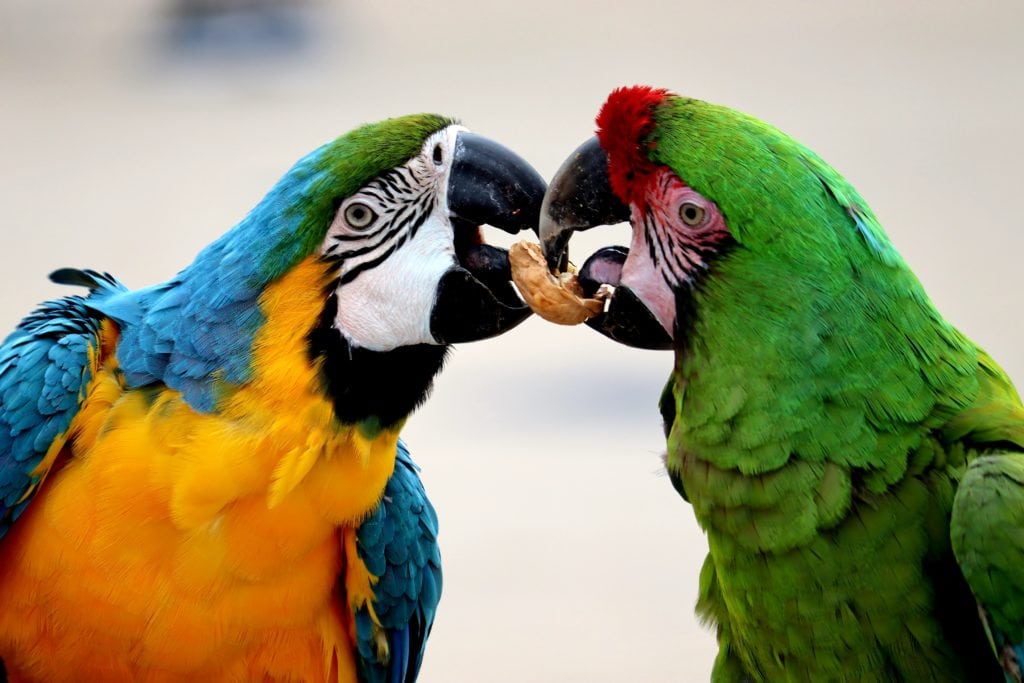
Macaws reach sexual maturity within three to four years. At this time, they will typically choose a mate. Macaws mate for life, which is especially impressive considering their long life spans. Macaw pairs bond very intensely with each other and spend most of their time together even when they are not breeding. They preen one another, share meals, and fly close together through the treetop canopy of the rainforest. The Macaw is a fantastic symbol of romance, fidelity, lifelong companionship, and steadfastness. (2)
Macaw Native American Symbolism
Amongst the Zuni people, the Macaw symbolizes summertime and the South. Although Macaws are generally found in South and Central America, due to extensive trade networks, many North American tribes were familiar with these birds. Some groups even kept Macaws in captivity. Macaw feathers were traded throughout the United States and are associated with authority, wisdom, and shamanism. (3)
The macaw appears in Central and South American myths as a boastful creature which tries to outshine the sun, or as a matriarch from whom all humans originated. The Macaw is also sometimes seen as a divine communicator due to its impressive vocal repertoire.
Macaw in Dreams
Dreaming of a Macaw can be a sign of bright things ahead, but it can also act as a reminder to be conscientious of one’s behavior. Because Macaws live such long lives, the Macaw can be a reminder not to take things so seriously. Look to the future and know that petty problems will not concern you at the end of your life. Filling your days with companionship and happy memories is more important than the silly issues which cloud our minds with anxiety.
Dreaming of a lone Macaw can signify loneliness or the search for one’s life partner. Conversely, dreaming of a Macaw pair may signify that romance is on the horizon.
Macaw Encounters and Omens
A Macaw encounter may represent communication. This is especially true if one encounters a domestic Macaw. These birds are incredibly skilled at mimicry and are capable of reproducing human speech. Encountering such a bird is a sign that one needs to speak one’s mind with confidence. Holding back your thoughts can lead to resentment and frustration.
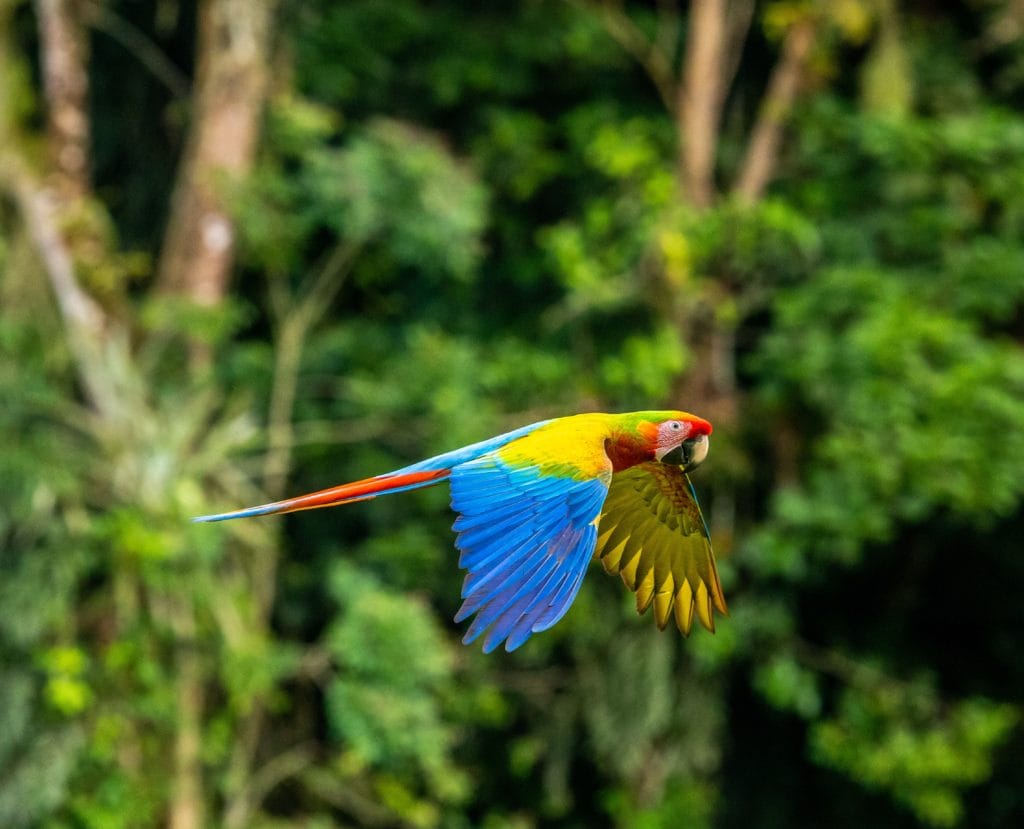
Because Macaws are often exported from their rainforest habitats to lead lives in captivity, a Macaw encounter may also represent a desire for freedom and agency or a sense that you are not in a place where you belong. Think about what actions you can take to change your environment and take control of the path your life is on.
Macaw in Mythology & Folklore
The following are just a few stories and legends from the Americas regarding the brilliant Macaw!
Native American Mythology:
Macaws feature in the mythologies of peoples throughout Central and South America. Even some tribes who lie in the Southwestern portions of North America share legends of these intelligent and colorful birds.
Amongst the Zuni people of the Southwestern United States, there is a legend which describes the separation of an ancient tribe of peoples into the people of the Macaw and the people of the Raven. In this tale, a great priest by the name of Yanauluha appeared before the people with a staff in his hand which was adorned with many colorful feathers and tinkling bells. The people were intrigued by this item and gathered around Yanauluha. As his audience grew, the priest struck the top of his staff and blew on the feathers until four round objects appeared at the staff’s end. Two of the objects were bright blue in color while two were a dull reddish brown. When the people asked Yanauluha what these intriguing object were, he explained that they were eggs. Within those eggs, he told them, was the destiny of the people. In one of the colored eggs there were brilliant birds cloaked in red, blue, and green. These birds would bring eternal summer and a life of ease and plenty to whomever followed them. The other eggs would yield a colorless bird which would bring a life of hard work and long winters. (4)
Desperately hoping to choose the vibrant bird of the summer, most of the people decided to nurture the bright blue eggs. They assumed that the multi-colored bird would hatch from the eggs that were the most colorful. When the eggs hatched, the baby birds did not yet have feathers, so the people fed them delicious fruits and waited to see their colors. In the end, though, those birds grew only black feathers and turned out to be ravens. So, the people who followed the ravens became the Raven People. They toiled through long winters and became strong and wise. Yanauluha sent the people who chose the other eggs, the reddish colored eggs, far to the south. Their eggs hatched out into colorful Macaws. The people who hatched the Macaw eggs became the Macaw People and led lives of plenty. They were not so strong as the Raven People, but they were wise. Yanauluha became the sun which watched over both peoples on the paths which they chose for themselves. (5)
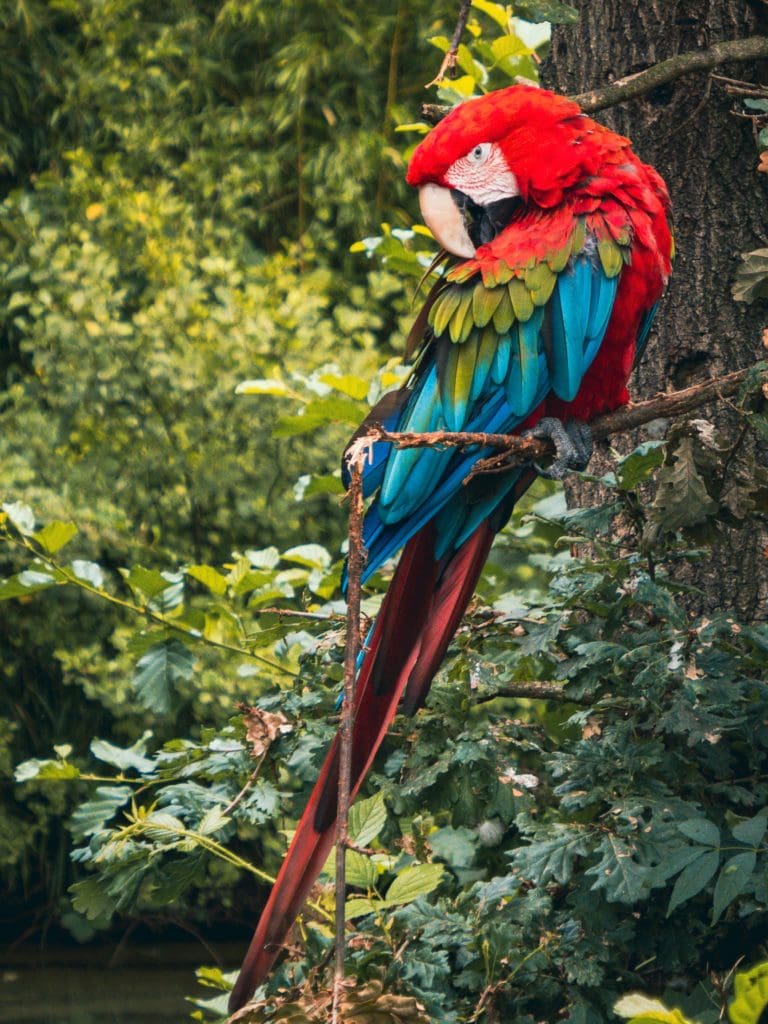
Mayan Mythology:
Selections from Mayan mythology were preserved in a document called the “Popol Vuh” which dates back at least as far as the early eighteenth century. The stories from within this manuscript are much older. One story from the Popol Vuh describes a god known as “Seven Macaw.” (6)
Seven Macaw was a bright and flamboyant Macaw who loved to adorn himself with colorful and shiny treasures. His nest was covered in metal and reflected a light so bright that Seven Macaw thought it could light up the whole world. Seven Macaw filled how beak with shiny teeth made from precious gems. Because he was so bright and conspicuous, the boastful Seven Macaw began to insist that he was the new sun god. Angry at Seven Macaw’s blasphemy, the hero twins of the Popol Vuh devised a plan to bring Seven Macaw down to earth and stop his boasting. First, they followed the bird to his tree and shot him with a blowgun. Their shot knocked Seven Macaw down and shattered his jaw and damaged his eyes. Enraged, Seven Macaw snatched an arm off of one of the brothers and hung it up in his nest. Desperate to retrieve the stolen arm, the twins recruited a wise old couple who came to Seven Macaw and told him that they were experts at repairing jaws. Seven Macaw was delighted and welcomed them into his nest. Once inside, the couple began tending to his jaw. Little did the bird realize that the pair were not fixing his jaw but replacing each of his shiny gemstone teeth with a plain white corn kernel. Once all of his teeth were gone, Seven Macaw realized that he could no longer claim to be the sun god. Without a purpose, he died on the spot and the brothers were able to retrieve the arm that he had stolen. (7)
The Mayans associated Seven Macaw with the “Big Dipper” or “Ursa Major” contstellation. The handle of the dipper was said to be Seven Macaw’s long tail feathers, while the ladle portion of the constellation was said to be his body. (8)
Inca Mythology:
In Inca legend the Macaw is a sacred bird. It is said that all of mankind is descended from the offspring of a Macaw woman. According to this story, all of the earth was once covered by a devastating flood. Only two brothers managed to escape the flood by climbing to the top of a mountain which grew taller to protect them as the flood waters rose. When the water subsided and the brothers climbed down, they struggled to survive on what meager food had outlasted the flood. Eventually, they built a house, but food remained scarce for them. One day, after a particularly unsuccessful search for food, the brothers returned to their house to find it full of freshly cooked food. Succulent meat, glistening ripe fruits, and delicious treats of all kinds were piled upon their table. (9)
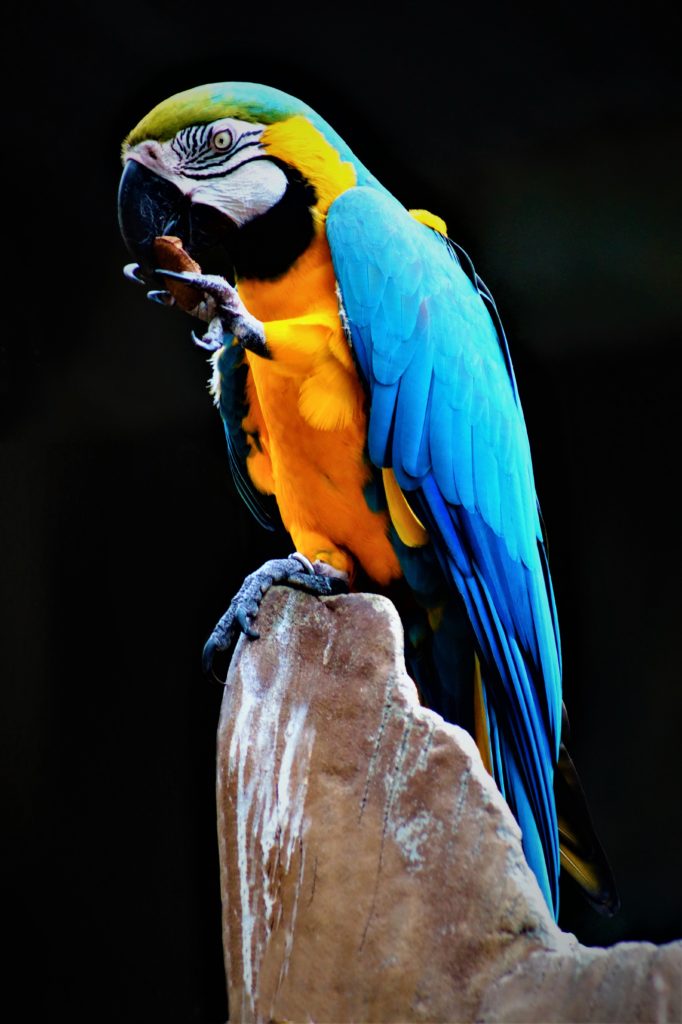
Day after day, food appeared for the brothers until one day they decided to lie in waiting and see who was bringing this bounty. When they did so, they saw a group of vibrantly colored Macaws with the beautiful faces of human women. The brothers leapt from their hiding spots to try and catch the Macaw women, but the birds were too fast and escaped, taking their food with them. The next time the Macaw women came, the brothers devised a plan. They slammed the door of their home shut and seized the smallest Macaw woman. Unable to escape, the Macaw woman became the brothers’ wife and eventually gave birth to six sons and six daughters. Over time, the children of the brothers and the Macaw woman repopulated the human species which had been almost eliminated by that mighty flood. So, the Macaw is the mother of mankind. (10)
Macaw Spirit Animal
If the Macaw is your spirit animal then you are a creative, emotional, intelligent, and expressive. People with the Macaw spirit animal form very intense relationships with others and are tend to be deeply empathetic and understanding.
The Macaw spirit animal is often drawn to the arts. Communicating their inner selves with others is this spirit animal’s major aspiration, so arts are an important tool for achieving this. The Macaw spirit animal gets along well with others but tends to form much stronger relationships with just a few close loved ones while maintaining a wide circle of friendly acquaintances.
Macaw Totem Animal
The Macaw totem animal is associated with growth and maturity. The Macaw can live for as many as one hundred years. With such a long life, the Macaw totem animal represents the many changes that a person undergoes whilst unlocking their potential. The Macaw totem embodies the depth of wisdom and maturity which a soul can only achieve through collecting experiences.
In this way, the Macaw totem also represents the importance of experimentation and risk taking. Nobody becomes perfectly wise without testing the boundaries a bit!
Macaw Power Animal
The Macaw power animal represents medicine and healing. The long life of the Macaw combined with the fact that Macaws are able to resist the toxic effects of some of the poisonous foods they consume connects these birds with health and wellness. (11)
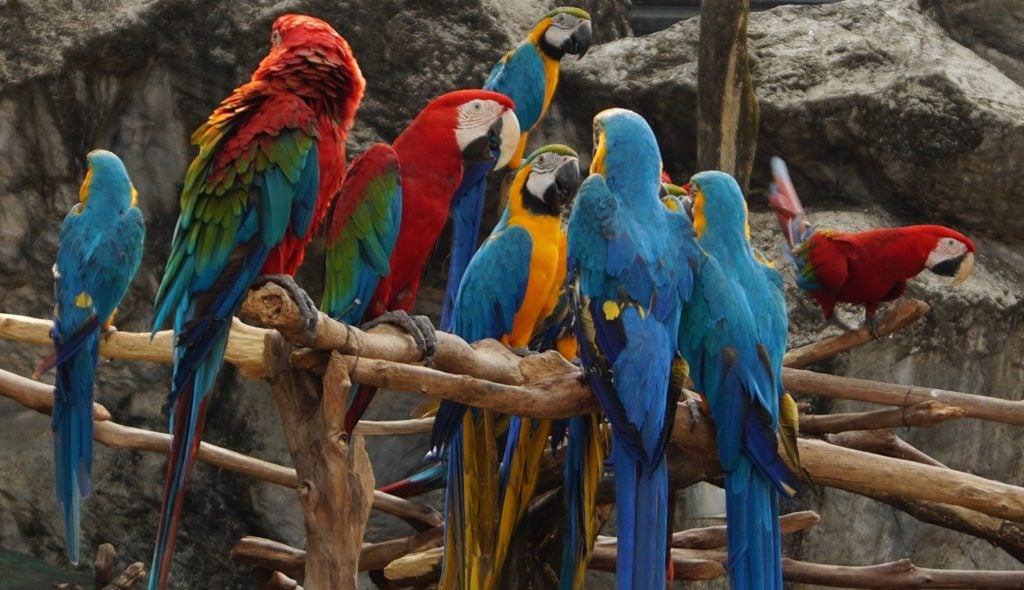
The Macaw’s power is a great reminder to focus on the variables that you can control when it comes to your health. One hundred years is a long time and us humans can live that long too with the right habits and a little luck.
Macaw Tattoo Meaning
A Macaw tattoo may be chosen to represent creativity, expression, intellect, or sociability.
A tattoo which features a pair of Macaws might represent the incredible pair bonding exhibited by these birds.
Conclusion
The Macaw is a ubiquitous symbol of the wild and beautiful rain forest. These habitats, in all of their breathtaking glory, are home to some of the most clever, stunning, and emotionally developed birds on this planet. As companions to humans and, especially, as wild symbols of the rain forests, the Macaw is unparalelled.
